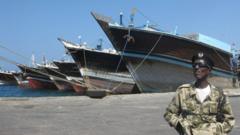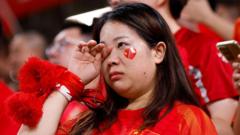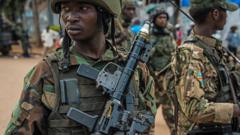China has intensified military exercises around Taiwan, paralleled by Taiwan's President Lai Ching-te's recent measures to counteract Chinese espionage and influence, signaling rising tensions in the region.
China's Military Exercises Signal Tensions with Taiwan Escalate

China's Military Exercises Signal Tensions with Taiwan Escalate
Beijing conducts drills around Taiwan following President Lai Ching-te's measures against Chinese influence.
On April 1, 2025, China commenced a series of military drills encircling Taiwan, aiming to deliver a stern message to the island's leadership. These exercises followed President Lai Ching-te's vocal denouncement of China as a "foreign hostile force" amidst his administration's initiatives designed to thwart Beijing's growing subversive actions in Taiwan.
Senior Colonel Shi Yi, a representative from the People's Liberation Army (PLA) who commands operations concerning Taiwan, asserted that military personnel comprising land, naval, and airborne units would "approach close" to Taiwanese territory. The focus of these drills involves practicing maneuvers for "seizure of overall control" and carrying out targeted strikes on both land and sea positions.
Clearly, this round of exercises is not merely routine; it serves as a direct response to Lai's policies, according to Zhu Fenglian, spokesperson for the Chinese government office overseeing Taiwan affairs. Zhu specifically referenced a speech made by Lai on March 13, wherein he rolled out a comprehensive suite of 17 countermeasures against perceived Chinese threats—a move that has provoked outrage in Beijing.
Lai’s strategies include reinstating military tribunals to handle allegations of espionage involving military personnel and enhancing scrutiny over cultural and political exchanges with China. This development highlights increased concerns over Taiwan's vulnerability to Chinese infiltration and influence.
Despite China's inflammatory rhetoric, the duration and proximity of these military exercises to Taiwan remain uncertain, aiming to intimidate without escalating into outright conflict. Lai and his Democratic Progressive Party maintain that Taiwan is not a part of China, a fundamental aspect of Beijing’s claims over the island, which they declare as integral to its territory. The political landscape continues to become more strained as conflicts of narrative and ideology deepen between the two sides.






















